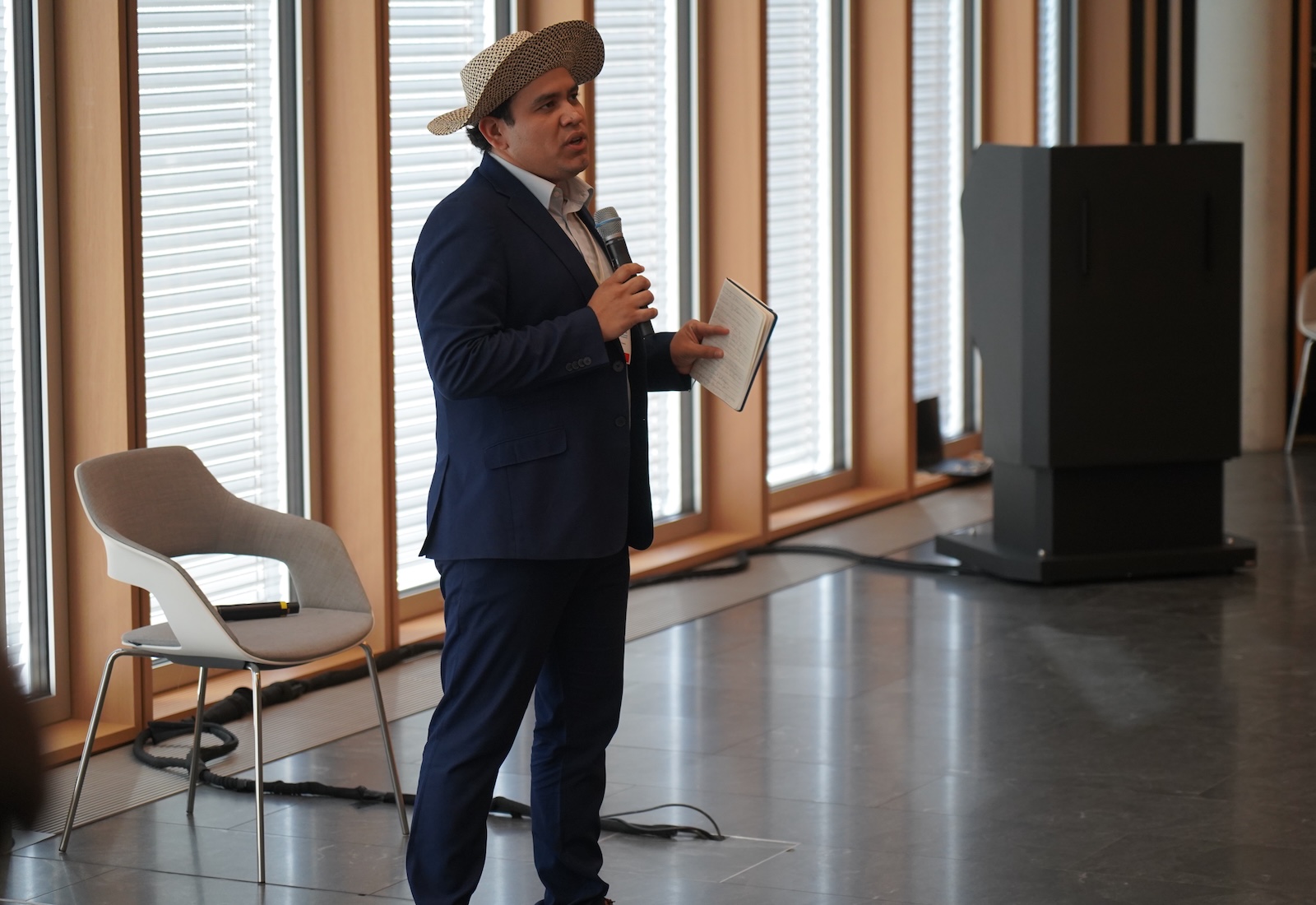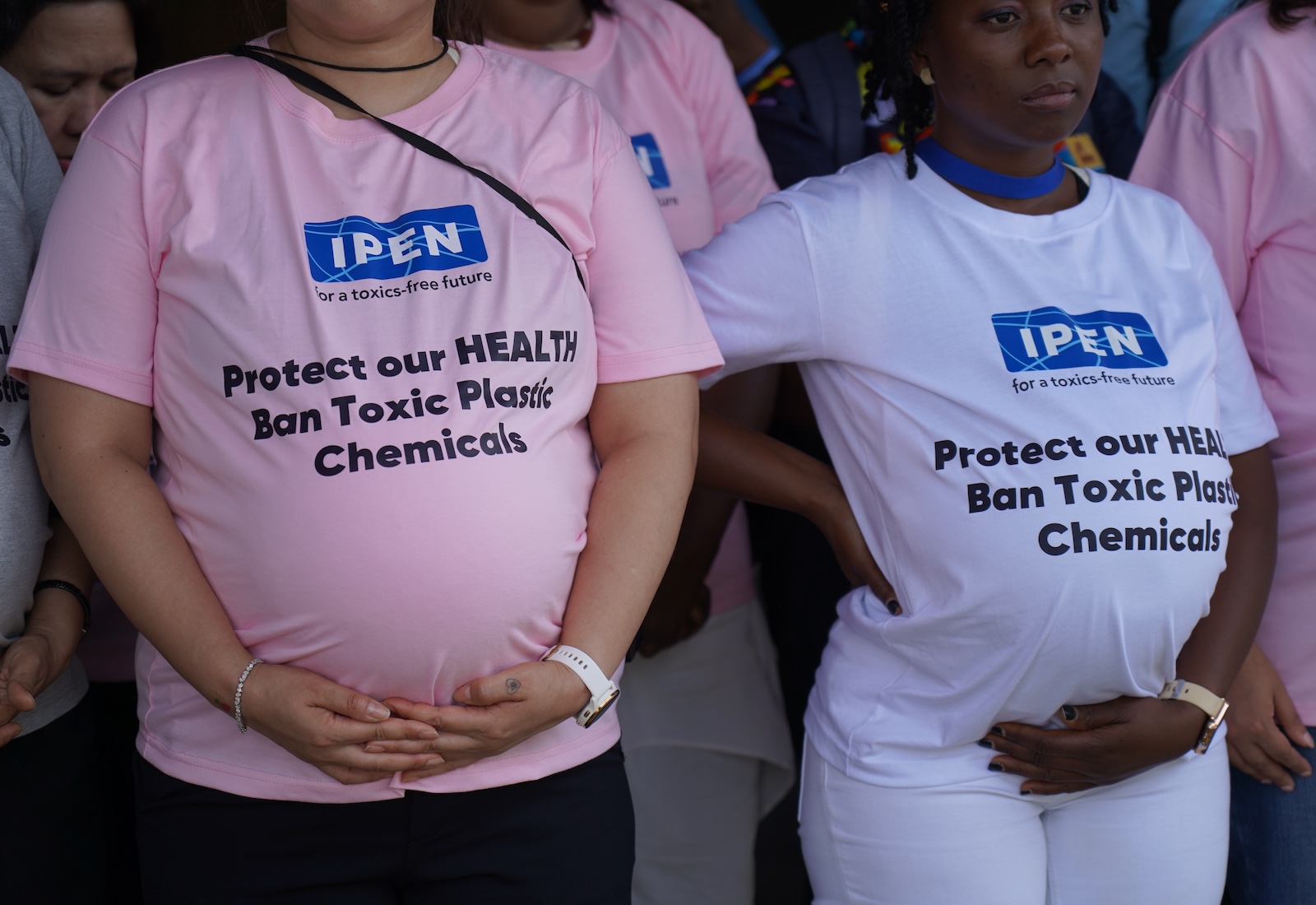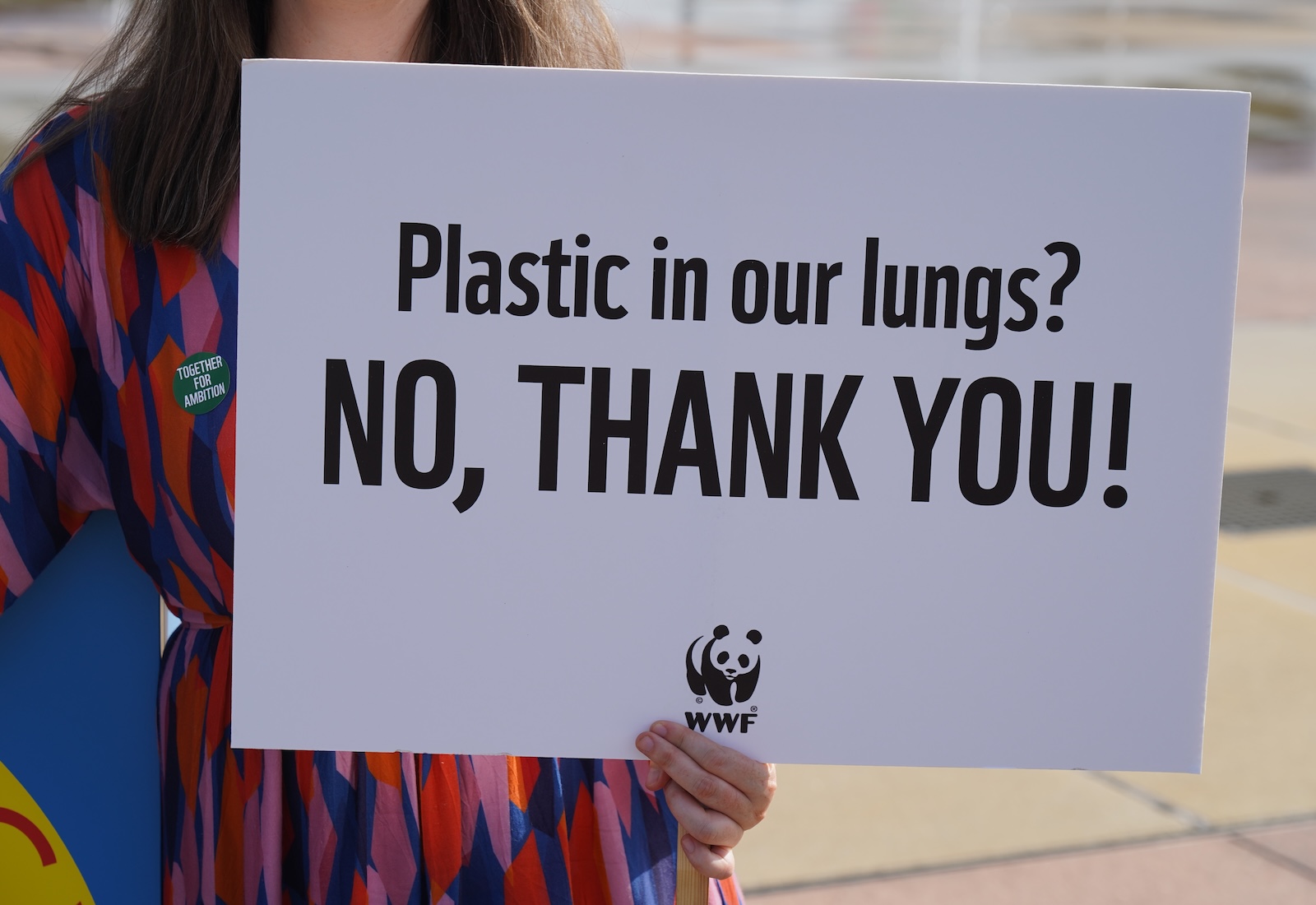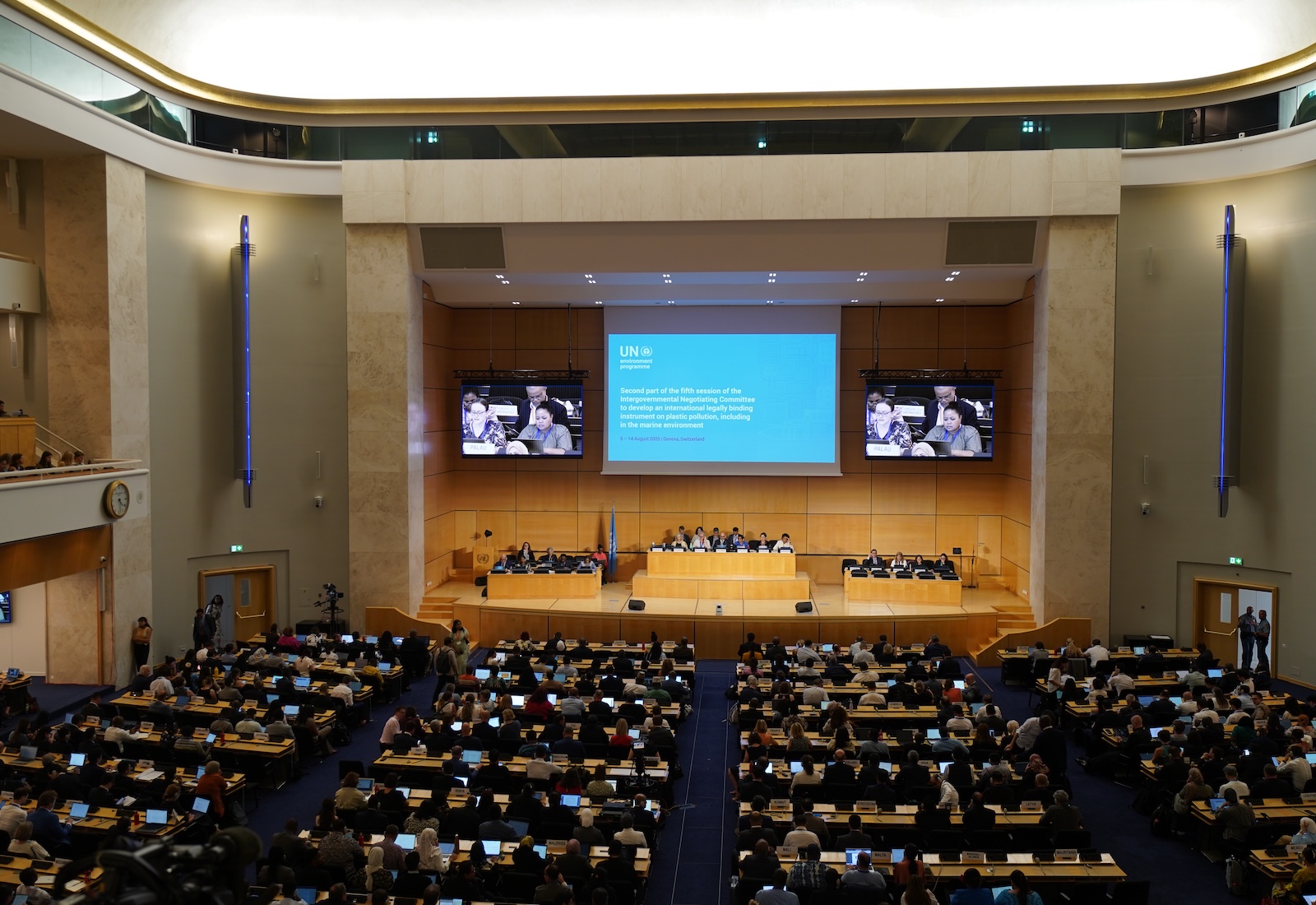Since negotiations for a United Nations treaty to address plastic pollution began more than three years ago, protecting human health has risen to the top of many countries’ priority lists. This is partly because the science on the issue has evolved so rapidly. There are now thousands of scientific papers showing how plastics affect people’s health at every stage of the material’s life cycle — from the extraction of oil and gas to the disposal of plastic trash — and more research is emerging all the time.
Juan Carlos Monterrey, Panama’s lead negotiator at the sixth round of treaty negotiations, which kicked off last week and goes until August 14 in Geneva, highlighted the connection during an event on Tuesday. “We’re here to build a treaty that prevents our babies from playing with toys that are full of phthalates and leads,” he told youth activists. New generations should not be ”poisoned by plastic even before they take their first breaths.”
But enshrining human health protections into the treaty is far from guaranteed. Some countries would like to remove any mention of it from the agreement, arguing that the topic would be better left to other international pacts. Now, during the final hours of what is meant to be the last round of treaty negotiations, those countries’ delegates have only grown more brazen. The most recent draft of the agreement removed a key reference to human health, a move that environmental groups were swift to denounce as “unacceptable.”

Joseph Winters / Grist
“I am worried,” said Christos Symeonides, a developmental pediatrician at Royal Children’s Hospital Melbourne in Australia, shortly before the new treaty text was released. Symeonides is also a member of the Scientists’ Coalition for an Effective Plastics Treaty, a group of independent experts attempting to guide the negotiations. “I don’t see another opportunity on the horizon to deal with this issue,” he added.
The connection between plastics and human health should, theoretically, be uncontested among those who are negotiating the plastics treaty. Countries acknowledged it in the mandate that they unanimously agreed to back in 2022, when they were deciding what the point of the plastics treaty would be. The science was already clear at that point that plastics posed a pervasive threat to human health; medical and research groups like the Endocrine Society had already been saying so for years
But even more evidence has emerged in the intervening time. One member of the Scientists’ Coalition, Megan Deeney — a research fellow at the London School of Hygiene and Tropical Medicine — rattled off some highlights during a press conference on Tuesday: Those living near petrochemical facilities in Europe, the U.K., the U.S., and Taiwan face a 30 percent higher risk of leukemia; people working in South Korean refineries face three times higher risks of oral cancer; a single plastics-related chemical causes 350,000 premature deaths from cardiovascular disease each year, as well as up to $3.7 trillion dollars in associated health care costs.

Protesters with the International Pollutants Elimination Network highlight the connection between plastics and adverse health effects to pregnant people.
Joseph Winters / Grist

A sign designed by the World Wide Fund for Wildlife decries microplastics entering people’s bodies.
Joseph Winters / Grist
“People are becoming more aware of [health], people are talking about it more,” said Bethanie Carney Almroth, an ecotoxicologist at the University of Gothenburg in Sweden and one of the leaders of the Scientists’ Coalition.
Each of the first three negotiating sessions showed broad support among countries for the treaty to include a legally binding obligation to protect human health from plastic pollution, according to reports prepared by the negotiations’ secretariat, which organizes the meetings. Early drafts of the agreement repeatedly mentioned human health, reflecting the topic’s salience among diplomats.
At the fourth round of negotiations, however — held last year in Ottawa, Canada — this apparent support began to fray. Although many delegates and the secretariat continued to speak about health’s role “at the heart” of the treaty, others started to complain that plastics-related health issues should instead be addressed by international bodies like the World Health Organization. Unnamed delegates argued that there is “no direct linkage between plastic pollution and health,” or that the evidence of such a linkage “is not well developed.” Saudi Arabia submitted a proposal that the treaty’s standalone article on health be deleted.
Scientists including Carney Almroth say this opposition stems from some countries’ economic interests. Protecting human health from plastics, she argues, requires banning hazardous chemical additives and scaling down plastic production — measures that are anathema to oil-producing countries, especially those that depend on fossil fuels for 40 percent or more of their federal budget revenues.
Some of the talking points she’s heard from delegates echo those of the petrochemical industry, which has shown up in increasing numbers at each successive round of plastics treaty talks.
What’s the connection between plastics and climate change?
Those countries seemed to get their wish on Wednesday afternoon. Though the treaty is still not finalized, the chair of the negotiations — Luis Vayas Valdivieso, an Ecuadorian diplomat — released a new draft for delegates to use during the remaining hours of the talks. It removed the standalone article on health, as well as other health-protective articles on controlling the production of plastic and phasing out hazardous chemicals.
“It’s as if the like-minded group drafted it,” one observer told Grist. Nonprofits and advocacy groups held a protest outside the conference venue where they called the new text “unacceptable” and “a betrayal of our frontline and Indigenous communities.” “Our health is on the line; our children are on the line; our future is on the line,” said Sarah Martik, executive director of the U.S. nonprofit Center for Coalfield Justice.

Joseph Winters / Grist
During a plenary session immediately following the text’s release, Monterrey said that the chair had “stomped,” “spat on,” and “burned” his country’s red lines on plastic production and human health. “This is simply repulsive,” he added. “It is not ambition, it is surrender, and we will not allow our future generations a treaty as weak as this.” Delegates from many other countries objected too, including Bangladesh, Brazil, Canada, Colombia, Chile, Denmark, Fiji, Kenya, and Nigeria.
Saudi Arabia’s delegate, by contrast — speaking on behalf of a group of Arab countries — called it a “milestone,” though he still said it crossed some of his unspecified “red lines.”

U.N. executives have also weighed in on the role of health in the treaty. On Saturday, during the launch of a new online dashboard cataloguing documented health impacts from plastics, U.N. Environment Programme Executive Director Inger Andersen suggested that health could be compromised in order to finalize a treaty by the end of Thursday. She told the audience that, although they had gathered to discuss human health, countries had originally agreed to a treaty addressing plastic litter in the environment. She described plastic debris in the oceans and insufficient waste management systems around the world, saying it would be “unacceptable” to allow the situation to continue. “Help me” secure this treaty, she told the room.
One scientist who attended the event said they were taken aback by the forcefulness of Andersen’s speech, which seemed to shift the conversation away from the full life cycle of plastic and toward pollution at the end of its life. It was clear to participants that she was telling them to “tone it down” with the health stuff, they told Grist. As head of the U.N. Environment Programme, Andersen’s aim is to shepherd countries toward a timely deal — but she’s faced criticism for doing so at the expense of ambition.

Joseph Winters / Grist
Jane Muncke, managing director and chief scientific officer for the Food Packaging Forum, a Swiss nonprofit, said that health is already in the treaty mandate and that it would be “preposterous” not to include it in the final agreement. “I do think there have been some irritations over how strong the health narrative has taken off,” she said, but “it’s not for Inger Andersen or anyone in the secretariat to decide.”
What happens next is not clear. Delegates have one more day of whirlwind talks to settle their disagreements and approve a draft of the text they all find acceptable — so far, no one has been willing to call for decision-making by a majority vote, meaning they’re still locked into searching for consensus. If they leave Geneva with no deal, the U.N. Environment Programme may have to schedule another round of negotiations, or it may try to add the treaty to the agenda of an upcoming Environment Assembly meeting at the end of the year.
For human health, as well as the environment and environmental justice, advocacy groups have made their preference clear: “No treaty is better than a bad treaty.”


